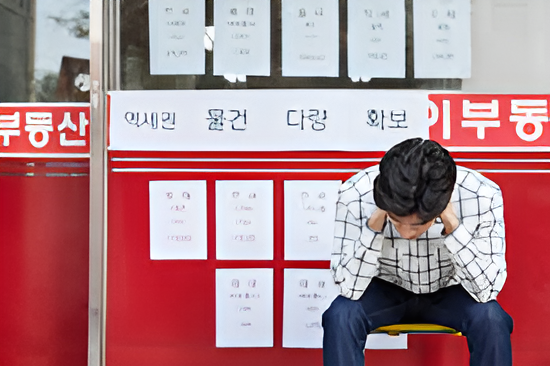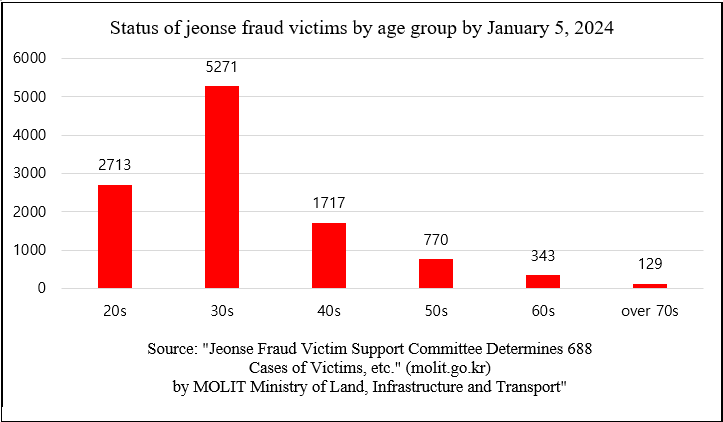[Feature] Jeonse Fraud Spreading Across University Districts, Threat- ening Housing Stability for Young Adults

A jeonse fraud victim sits in despair, highlighting the housing insecurity faced by young people. Photo: dailypop (dailypop.kr)
Jeonse fraud, a growing financial crime targeting university students and young professionals, has become a serious housing crisis in South Korea, particularly in areas with major universities. According to the Ministry of Land, Infrastructure and Transport (MOLIT), Gangseo-gu—where universities such as Yonsei University, Ewha Womans University, and Sogang University are located—has suffered 10 billion won in damages, while Gwanak-gu, home to Seoul National University, reported 1,300 cases—the highest in Seoul. With 73.3% of victims in their 20s and 30s, young adults, who often lack financial security, are disproportionately affected, underscoring the urgent need for countermeasures.

Source: “Jeonse Fraud Victims Support Committee Determines 688 Cases of Victims, etc.” by MOLIT (molit.go.kr)
Understanding Jeonse Fraud and Its Methods
How Jeonse Fraud Works
Jeonse is a unique rental system in South Korea where tenants deposit a lump sum instead of paying monthly rent. At the end of the lease, the landlord is supposed to return the deposit in full. While this system alleviates the financial burden of monthly rent, the substantial deposit transferred to landlords makes tenants vulnerable to fraud.
A growing number of cases have emerged where landlords refuse to return deposits even after lease agreements expire, leaving tenants financially devastated. One common jeonse fraud involves landlords defaulting on excessive loans, failing to return deposits, or using properties as collateral for loans and then deliberately allowing them to go into foreclosure—thus stripping tenants of their deposits.
Real estate agents sometimes play a role in the deception. In some cases, real estate agents misrepresent contracts, tricking tenants into signing agreements that offer fewer legal protections than they realize. This scheme could even be conducted through government-certified real estate agencies that have fallen prey to these fraudulent schemes.
Causes and Consequences of Jeonse Fraud
The fundamental cause of jeonse fraud is the imbalance of information between tenants, landlords, and real estate agents. Professor Kim Joong-baeck from the Dept. of Sociology at Kyung Hee University explains that young renters, particularly university students, often lack the financial experience and resources to verify a property’s security before signing a lease. Financial limitations compel them to seek affordable housing with limited transaction histories or insufficient information, making them prime targets for fraud. He also noted that the lack of mandatory disclosure requirements for villa transactions and the difficulty of maintaining a public transaction record further exacerbate the information gap.
Due to rising jeonse fraud, many young tenants are opting for monthly rentals instead. According to the 2024 Housing Market Analysis by the Korea Housing-Finance Corporation, the proportion of monthly rental transactions nationwide in the first half of the year surged to 57.5%, compared to the five-year average of 46.0%.
However, this shift toward monthly rentals has driven up rental prices. In university districts, rental prices have seen steep increases, with monthly rent near Sungkyunkwan University rising from 530,000 won in August 2023 to 620,000 won in 2024, according to Newsis. According to Dabang, a real estate information-sharing application, rental prices near Hankuk University of Foreign Studies and Hanyang University rose by 6.6% and 5.7%, respectively. Ultimately, the damage caused by jeonse fraud is not limited to individual victims but extends to a broader housing crisis, further destabilizing the living conditions of young adults.
Government Measures to Combat Jeonse Fraud
In response to the growing crisis, the government has implemented policies to prevent jeonse fraud and support victims. In June 2023, the Jeonse Fraud Victims Special Act was enacted to expedite legal assistance for affected tenants, and response teams were deployed in areas with high fraud concentrations.
The MOLIT also introduced financial and housing support policies to aid victims in recovering their deposits and securing stable housing. In May 2024, the MOLIT unveiled the Jeonse Fraud Victims Housing Stabilization Plan, under which the Korea Land & Housing Corporation (LH) acquires auctioned properties previously occupied by victims and converts them into public rental housing, allowing victims to remain in their homes. Additionally, special loan programs have been introduced to ease financial burdens by relaxing eligibility requirements and lowering interest rates.
The MOLIT is actively sharing information on different types of jeonse fraud and preventive measures to protect tenants. To enhance transparency and legal protection, the MOLIT has launched the Safe Jeonse application, which enables tenants to verify a property’s ownership and financial status before signing a lease. Stricter regulations now hold real estate agents more accountable for fraudulent transactions to minimize potential fraud risks.
Remaining Challenges and Potential Solutions
Despite these efforts, jeonse fraud remains a pressing issue. According to a MOLIT report published on December 20, 2024, 910 cases of jeonse fraud were reported within a recent month, bringing the cumulative total to 25,578 cases. Additionally, existing government initiatives face limitations. LH’s property acquisition program also faces obstacles, as support is only available for properties that have completed auction procedures, excluding properties still undergoing legal processes. Consequently, landlords often neglect building maintenance costs, shifting additional financial burdens onto victims.
While the Jeonse Fraud Victim Support Centers provide assistance with filing claims and information access, they fall short in offering substantial legal consultation or direct financial recovery. Under current laws, victims must provide evidence of fraud and initiate lawsuits, adding financial and emotional strain. Moreover, under current regulations, at least two victims must be identified for a case to qualify for government support, excluding single-victim cases from receiving aid.
Given these limitations, tenants must take proactive steps to protect themselves. Tenants are advised to conduct thorough due diligence, including checking property registration certificates, verifying jeonse insurance coverage, and assessing landlords’ financial status before signing contracts.
As jeonse fraud continues to inflict economic and psychological distress on young adults, it has evolved into a nationwide housing crisis with no immediate resolution. Legislative reforms are needed to bridge the information gap, strengthen preventive measures, and ensure victims receive timely support. Until then, raising public awareness remains crucial in fostering a more transparent and secure rental market.
There are no registered comments.
I agree to the collection of personal information. [view]

